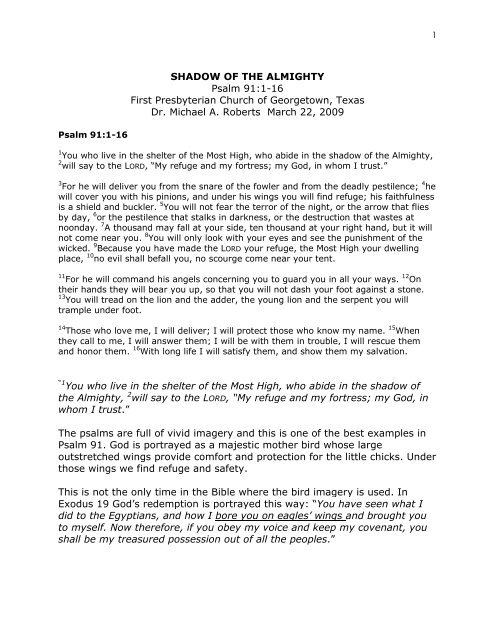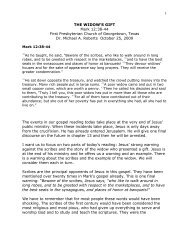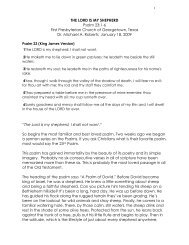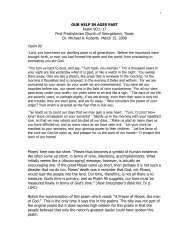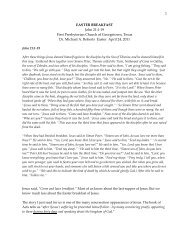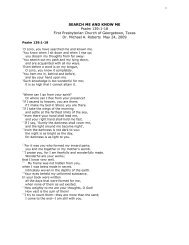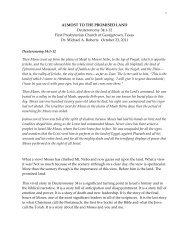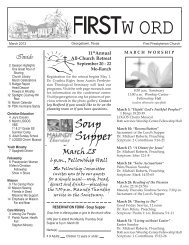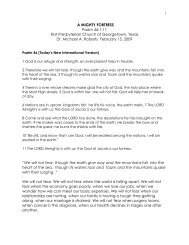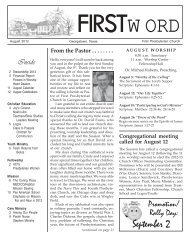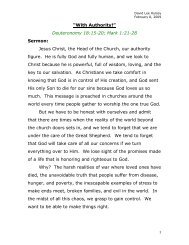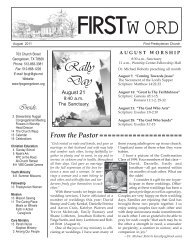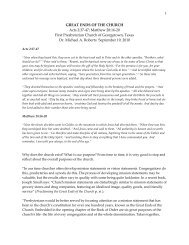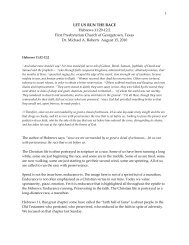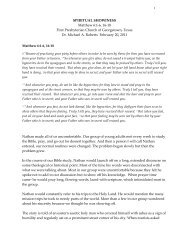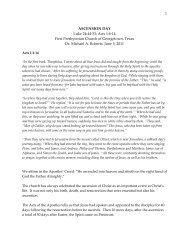SHADOW OF THE ALMIGHTY Psalm 91:1-16 First Presbyterian ...
SHADOW OF THE ALMIGHTY Psalm 91:1-16 First Presbyterian ...
SHADOW OF THE ALMIGHTY Psalm 91:1-16 First Presbyterian ...
Create successful ePaper yourself
Turn your PDF publications into a flip-book with our unique Google optimized e-Paper software.
1<br />
<strong>SHADOW</strong> <strong>OF</strong> <strong>THE</strong> <strong>ALMIGHTY</strong><br />
<strong>Psalm</strong> <strong>91</strong>:1-<strong>16</strong><br />
<strong>First</strong> <strong>Presbyterian</strong> Church of Georgetown, Texas<br />
Dr. Michael A. Roberts March 22, 2009<br />
<strong>Psalm</strong> <strong>91</strong>:1-<strong>16</strong><br />
1 You who live in the shelter of the Most High, who abide in the shadow of the Almighty,<br />
2 will say to the LORD, “My refuge and my fortress; my God, in whom I trust.”<br />
3 For he will deliver you from the snare of the fowler and from the deadly pestilence; 4 he<br />
will cover you with his pinions, and under his wings you will find refuge; his faithfulness<br />
is a shield and buckler. 5 You will not fear the terror of the night, or the arrow that flies<br />
by day, 6 or the pestilence that stalks in darkness, or the destruction that wastes at<br />
noonday. 7 A thousand may fall at your side, ten thousand at your right hand, but it will<br />
not come near you. 8 You will only look with your eyes and see the punishment of the<br />
wicked. 9 Because you have made the LORD your refuge, the Most High your dwelling<br />
place, 10 no evil shall befall you, no scourge come near your tent.<br />
11 For he will command his angels concerning you to guard you in all your ways. 12 On<br />
their hands they will bear you up, so that you will not dash your foot against a stone.<br />
13 You will tread on the lion and the adder, the young lion and the serpent you will<br />
trample under foot.<br />
14 Those who love me, I will deliver; I will protect those who know my name. 15 When<br />
they call to me, I will answer them; I will be with them in trouble, I will rescue them<br />
and honor them. <strong>16</strong> With long life I will satisfy them, and show them my salvation.<br />
“1 You who live in the shelter of the Most High, who abide in the shadow of<br />
the Almighty, 2 will say to the LORD, “My refuge and my fortress; my God, in<br />
whom I trust.”<br />
The psalms are full of vivid imagery and this is one of the best examples in<br />
<strong>Psalm</strong> <strong>91</strong>. God is portrayed as a majestic mother bird whose large<br />
outstretched wings provide comfort and protection for the little chicks. Under<br />
those wings we find refuge and safety.<br />
This is not the only time in the Bible where the bird imagery is used. In<br />
Exodus 19 God’s redemption is portrayed this way: “You have seen what I<br />
did to the Egyptians, and how I bore you on eagles’ wings and brought you<br />
to myself. Now therefore, if you obey my voice and keep my covenant, you<br />
shall be my treasured possession out of all the peoples.”
2<br />
Even Jesus uses the imagery when he grieves over Jerusalem: “ Jerusalem,<br />
Jerusalem, the city that kills the prophets and stones those who are sent to<br />
it! How often have I desired to gather your children together as a hen<br />
gathers her brood under her wings, and you were not willing!” (Luke 13:34).<br />
This psalm is about God’s ongoing care for us. God provides shelter, a home<br />
that provides comfort. God provides the shadow of the Almighty, the<br />
peaceful, calm presence in God’s care. “He will cover you with his pinions,<br />
and under his wings you will find refuge.”<br />
So this psalm highlights God’s care and protection. It also highlights our<br />
trust in God. We entrust our lives to God’s care. We believe that God cares<br />
for us.<br />
All of us at some point face situations where we need to trust. Perhaps we<br />
face a serious illness. Or we find ourselves out of work or in work that is not<br />
enough for us. Perhaps our family life is turbulent right now. Or God seems<br />
silent in the midst of our troubles.<br />
The psalmist encourages us: “those who abide in the shadow of the<br />
Almighty, will say to the LORD, “My refuge and my fortress; my God, in<br />
whom I trust.”<br />
What follows in verses 3 to 13 of the psalm are very specific forms of God’s<br />
care and protection. “ For he will deliver you from the snare of the fowler (a<br />
fowler by the way is a hunter of birds) and from the deadly pestilence…You<br />
will not fear the terror of the night, or the arrow that flies by day, or the<br />
pestilence that stalks in darkness, or the destruction that wastes at noonday.<br />
A thousand may fall at your side, ten thousand at your right hand, but it will<br />
not come near you…no evil shall befall you, no scourge come near your<br />
tent.”<br />
Most commentators take these dangers literally. Facing battle and plagues of<br />
various kinds. There are others who think what the psalmist is describing are<br />
demonic powers, especially the powers present in the Babylonian religions.<br />
Either way, the main emphasis is on God’s consistent care, protection, and<br />
support.<br />
This care takes place during all parts of the day and night. From the earliest<br />
days of the church, <strong>Psalm</strong> <strong>91</strong> was one of a very few psalms almost all agreed<br />
should be prayed every day. The only question was when. In the Eastern<br />
church, it was typically prayed at midday in response to the mention of “the<br />
arrow that flies by day or the destruction that wastes at noonday.” In the
3<br />
Western church, this psalm typically was prayed in the evening so that “you<br />
will not fear the terror of the night or the pestilence that stalks in the<br />
darkness”(Ben Patterson God’s Prayer Book p. 231).<br />
The psalm goes on to say in verse 11: God will “command his angels<br />
concerning you to guard you in all your ways. On their hands they will bear<br />
you up, so that you will not dash your foot against a stone.”<br />
This is one of two biblical references in support of guardian angels, by the<br />
way. The other reference is in Matthew’s gospel when Jesus says: “Take care<br />
that you do not despise one of these little ones; for, I tell you, in heaven<br />
their angels continually see the face of my Father in heaven.”<br />
With only these two scriptural references and both somewhat indirect,<br />
Protestants don’t emphasize guardian angels much. This is more developed<br />
in the Catholic tradition of the church. The angel protects the body and soul<br />
of the believer, it is thought, plus presents our prayers to God.<br />
This psalm has an unusual distinction- it is the only scripture that we know<br />
of that is quoted by the devil. If we had not read the story of Jesus’<br />
temptations today, would you have remembered that Satan quotes this<br />
verse to Jesus I am not sure that I would of.<br />
Jesus is taken in his mind to Jerusalem, to the pinnacle of the temple and<br />
asked to jump. The devil says: "If you are the Son of God, throw yourself<br />
down from here.” The tempter quotes scripture to Jesus from the <strong>91</strong> st <strong>Psalm</strong>:<br />
'He will command his angels concerning you, to protect you,' and 'On their<br />
hands they will bear you up, so that you will not dash your foot against a<br />
stone.' "<br />
“Jump Jesus and the angels will save you.” Claim the promise of the<br />
scriptures. No one else can do it, Jesus. Just think how the people will flock<br />
to you. Be the showman, be the miracle-worker, be the superstar."<br />
Fortunately, Jesus can discern the inappropriate use of scripture. And the<br />
appropriate use. So he recalls the words of Deuteronomy: "Do not put the<br />
Lord your God to the test." Testing means taking for granted what God will<br />
do for you. Expecting God to do certain things. Assuming certain actions.<br />
Attempting to box God up rather than allowing God to be free.
4<br />
I like the way that scholar James Mays expresses it: “The temptation was to<br />
take the promised protection of God into the control of his own will and act.<br />
That would have shifted the power of the promise from the free sovereignty<br />
of God to individual willfulness. Jesus saw that as a way to test God, not as a<br />
way of trust. Real trust does not seek to test God or to prove his<br />
faithfulness” (<strong>Psalm</strong>s p. 298).<br />
Jesus believed that his miracles had a purpose: to honor God and help<br />
people. Jumping off the temple does neither. The miracles were not for<br />
show. Not for jumping off buildings or zapping stones into bread. Jesus could<br />
have attracted many to his ministry by using such showy methods. Instead,<br />
he chooses to make disciples slowly, to teach people who are willing to hear,<br />
to die upon a cross.<br />
We too are tempted to manipulate God, often in very subtle ways. We are<br />
tempted to box God up with our expectations. We do so when we expect<br />
God to do too little or too much or for the wrong purposes. We are often<br />
tempted to go “without a net” so to speak because God, we think, will surely<br />
protect us or preserve us. We are tempted as a church to use the tools of<br />
the marketplace when they may not be Christ’s ways at all. We are tempted<br />
whenever we salute the big production more than small acts of kindness.<br />
We are tempted whenever we applaud the spectacular, the showy, the<br />
miraculous, at the expense of the disciplines of prayer, teaching, and humble<br />
service. "Do not put the Lord your God to the test."<br />
The inappropriate use of the psalm by the devil should caution us concerning<br />
how we use the psalm. It is easy based on the middle section of the psalm<br />
to claim that God will protect us from everything. And there is no question<br />
that believers will sense God’s protection from time to time in their lives.<br />
God will help us, God will heal us, God will watch over us.<br />
There are also times, though, when we don’t seem protected at all. As a<br />
pastor, I’ve been involved in people’s lives long enough to know that<br />
troubles still come our way as believers in God. Christians do face serious<br />
illnesses, they do die in battle, they do face terrible situations. Even this<br />
psalm recognizes this in verse 15 when God speaks: “I will be with them in<br />
trouble.”<br />
We will face trouble as God’s people. So what we can’t do is interpret this<br />
psalm in such a way that says God will protect us from all of life’s troubles<br />
and difficulties. “We should not use <strong>Psalm</strong> <strong>91</strong> as a magical guarantee against<br />
danger, threat, or difficulty” (New Interpreter’s Bible IV p. 1048).
5<br />
This is the way that God’s people have understood this psalm. A couple of<br />
examples might illustrate the point.<br />
In 1956 Jim Elliott went to Ecuador as a missionary. He was murdered along<br />
with four other young missionaries- killed by the very people they came to<br />
share the Good News with. Jim’s wife Elisabeth Elliot was left. She was a<br />
young wife and a new mother, and now she was a widow. Could she still<br />
trust the promises of <strong>Psalm</strong> <strong>91</strong> When she wrote Jim Elliot’s biography a few<br />
years later, the title she gave it answered this question. It came from <strong>Psalm</strong><br />
<strong>91</strong>- Shadow of the Almighty. She understood that in spite of life’s difficulties,<br />
we still abide in God’s shadow and care (Ben Patterson God’s Prayer Book p.<br />
230).<br />
I have also been helped in thinking about God’s providence by the writings<br />
of John Calvin. We celebrate his 500 th birthday this year in 2009. He did not<br />
have an easy life. His wife died at an early age. His only child, a son, died<br />
in infancy. He suffered from many diseases. He was rejected more than<br />
once by his followers, once being kicked out of Geneva by bodily force.<br />
And yet Calvin’s writings shine forth with some of the most glorious praise<br />
for God’s care. Calvin recognized the problems of God’s providence and<br />
devoted thirty pages to it in his Institutes of the Christian Religion. Calvin<br />
says we must acknowledge secondary causes for events as well as seeing<br />
God as the primary overseer or superintendent for our world. These<br />
secondary causes are often in conflict with the way that God would like to<br />
work in our world. We live in a damaged world. These things will happen,<br />
Calvin would say, and we need to recognize that they come as a result of<br />
our damaged world not because God wills it.<br />
Calvin also acknowledges that we will not be kept from all problems or evil.<br />
He certainly wasn’t. The prophets or apostles were not. Jesus didn’t escape<br />
it all. And neither will we. Calvin says rather that God’s care and protection<br />
means that God’s presence in our lives will enable us to deal with the<br />
difficulties that we encounter. In <strong>Psalm</strong> 23 there is a valley of death and yet<br />
the psalmist trusts even still in the Lord as shepherd. Life has real problems<br />
that Christians, like everyone else, will encounter. God’s providence means<br />
that God’s presence and care will enable us to cope with them.<br />
Calvin adds that when it is difficult to believe, that’s what faith is all about.<br />
Sometimes we don’t know all the facts or have all the evidence but we trust<br />
anyway. Sometimes it looks hopeless or as if God is asleep but we put our<br />
fragile faith in his hands. We can do that because of past experience or by
6<br />
reflecting on how God has dealt with people in the past. But sometimes it<br />
doesn’t seem like an easy thing to throw our lot in with God and yet we do.<br />
We entrust our lives to God’s care. We are in God’s care. We believe that as<br />
we live this life we are in God’s care and we believe that when we leave this<br />
life we are also in God’s care. Yet, when we say that we are in God’s care,<br />
we are not saying that problems and difficulties, even suffering will not come<br />
our way.<br />
What we affirm is that even in the midst of problems and difficulties and<br />
suffering, God is still present with us- offering strength, guidance, comfort.<br />
God still cares for us even when life is difficult. God is still ready to listen and<br />
willing to help us. What we know is that ultimately, whatever the<br />
circumstances may be, we are secure in God’s love.<br />
There are many who have pointed out that <strong>Psalm</strong> <strong>91</strong> can be considered the<br />
Old Testament equivalent of Romans 8:31-39.<br />
The words of Romans ring true: “ 35 Who will separate us from the love of<br />
Christ Will hardship, or distress, or persecution, or famine, or nakedness, or<br />
peril, or sword...No, in all these things we are more than conquerors<br />
through him who loved us. For I am convinced that neither death, nor life,<br />
nor angels, nor rulers, nor things present, nor things to come, nor powers,<br />
39 nor height, nor depth, nor anything else in all creation, will be able to<br />
separate us from the love of God in Christ Jesus our Lord.”<br />
We are in God’s care. We abide in the shadow of the Almighty. Nothing will<br />
be able to separate us from God’s love. Amen.


